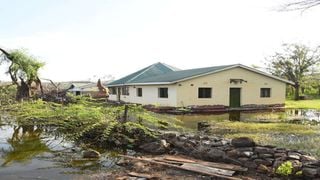
Abandoned houses at the gate of Lake Bogoria Game Reserve after water from Lake Bogoria swamped the structures. Rift Valley lakes have received global attention as the water levels rise displacing thousands of people.
| Cheboite Kigen | Nation Media GroupBaringo
Premium
What next for owners of submerged land in Baringo?
What you need to know:
- The situation is replicated in all the villages surrounding the Rift Valley lakes.
- Residents are torn between suing the government for compensation for their losses or waiting for the water to recede so that they go back to their homes.
When Lake Bogoria started rising and gobbling up its shores in 2013, Mr Joseph Kurere, a village elder, moved his parents to a higher ground in Majindege village.
The waters caught up with them in their new sojourn, forcing them to move again.
Soon after their exit, the entire Majindege and neighbouring Keria village were inundated, rendering at least 255 families homeless. Today, there is no sign that the village, which was a clear 12 kilometres away from the lake, ever existed.
Last year, two of Mr Kurere’s farmlands in Majindege, the place of his birth, were swallowed up by the swelling lake, leaving his family holding onto valid title deeds to a five-hectare and a 12-hectare parcel. His only source of livelihood and future now remain at sea, literally.
“The ground starts exhibiting white patches and getting wet. Then slowly, the water emerges and in no time, the area is filled with water, which gradually connects with Lake Bogoria,” Mr Kurere explained.
The situation is replicated in all the villages surrounding the Rift Valley lakes. And like Mr Kurere, the owners of these parcels are now faced with a legal dilemma.
They are torn between suing the government for compensation for the lands they have lost – since they have legal and valid title deeds for them – and waiting for the water to recede so that they go back to their homes.
A technical committee formed by the Ministry of Environment and Forestry and the National Security Advisory Committee (NSAC) to assess the socio-economic impact and causes of the rising water levels in Lake Victoria and the Rift Valley lakes stated that at least 33,000 families have lost their farms.
“There are simmering legal challenges due to loss of a total of over 21,000 hectares (about 52,000 acres) due to the rising water levels.
Genuine grievances
“Some of the land that has been submerged has legal title deeds, implying that the holders have genuine grievances that would require a government programme to address,” a report prepared by the committee and presented to Environment Cabinet Secretary Keriako Tobiko indicates.
The report, however, claims that some of the landowners had encroached on riparian land, a situation that Environment Principal Secretary Chris Kiproo blames on lack of sound policies over the years.
Although the Environmental Management and Co-ordination Act and land laws in Kenya are silent on the issue of compensation with regard to natural disasters such as floods and landslides, the task force recommended that the government should determine new high-water marks and ensure new guidelines on riparian lands are communicated and effectively enforced.
The Nation noted that many residents were under severe stress from the losses they have incurred due to the rising lakes.
Lake Bogoria Curio, Bar and Restaurant owner Kipchumba Kipkeron said he had invested all his life savings in the business and a home and now his 18 years worth of investment have been lost. He now stays in a rented single room in Loboi Centre with his family. Mr Kipkeron has a valid title deed for his property.
If the government determines and maps new riparian lands as the Environment ministry recommended, this may lead to compensation and resettlement.
“This may be necessary for posterity; to avoid a situation where continued rise in lake waters may lead to human and wildlife casualties,” PS Kiptoo said.
Although article 62 of the Constitution provides that the area between the highest and the lowest water mark is public land, the country lacks data on this.
Environmental expert Ratemo Michieka blames corruption for issuance of title deeds for some of the land that surrounds the lakes and encourages due diligence when people are buying land.
“Most people insist on buying riparian land. They are not conned, but they don’t conduct their research properly. We cannot blame the government for such,” Prof Michieka says.





